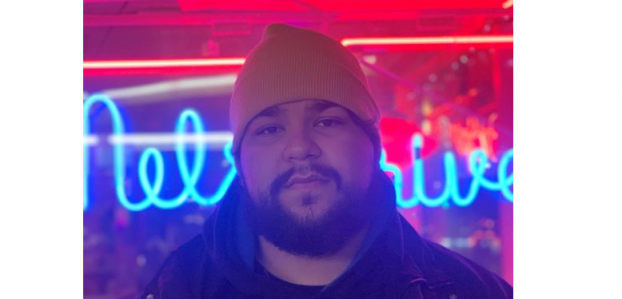Student Spotlight – David Figueroa
Meet fourth-year undergraduate researcher David Figueroa!
David Figueroa majors in Psychology and minors in Film, Television, Digital Media and is in our Undergraduate Research Fellows Program (URFP). The title of his project is “Buy It All and Then Some: How Social Status Induces Selfishness Under Resource Scarcity.” He focuses on understanding why we observe selfishness even when such behaviors may be detrimental to other people. His best piece of advice to write a research plan, but be flexible with it!
How did you first get interested in your research project?
In March 2020, we saw a panic-buying response to stay-at-home orders and COVID-19. There is a particular case study that surprised me: a man purchased over 17,700 bottles of hand sanitizer across Tennessee and Kentucky. At about $3 a bottle, not including tax, such a purchase would cost over
$50,000. That amount is almost 3 times above the poverty line for a single-person household in the United States. For some, $50,000 is not even their yearly income, let alone funds available to stock up on hand sanitizer. In February 2021, we saw instances of wealthy, white LA residents using vaccine access codes that were meant for Black and Latino communities to get vaccinated for COVID-19. The reason these behaviors are concerning is that they were done when resources were scarce. Hand sanitizer was limited when stay-at-home orders first began, and as we all know, there are currently not enough vaccines for everyone. The question then arose: Within the context of resource scarcity, will high-status individuals act more selfishly than low-status individuals?
What has been the most exciting aspect of your research so far?
The most exciting aspect of my research so far has been being able to collaborate with my graduate student mentor, Lauren Hofschneider, as well as my faculty advisor, Dr. Tomiyama. I had already been working in Dr. Tomiyama’s DiSH lab coordinating one of Lauren’s studies; we already knew each other long before the start of my personal research. However, being able to create an original project and collaborate with those who have supported and mentored you throughout your undergraduate career was an opportunity I could not miss. I am forever in debt to both for taking a chance on my crazy idea almost a year ago.
What has surprised you about your research or the research process?
The most surprising aspect of the research process that I have become aware of was how long it takes to get research off the ground. Hours, days, weeks must be spent learning and researching the literature, waiting for IRB approval, and finalizing your research materials. All of this is not even taking into consideration waiting for funding and other collaborators to be ready as well. It is all part of the process.
What is one piece of advice you have for other UCLA students thinking about doing research?
Plan. Plan for every single step of the process because it will be hard to know where you are going or what you must do without some sort of record to keep you on track. Related to this, is to be flexible with this plan. Sometimes you will find yourself ahead of your schedule and other times something may take twice as long to complete as you had originally anticipated. Write a research plan, but do not write it in stone.
What effect do you hope your research has in your field, at UCLA, in your community, or in the world?
The most fundamental aspect of my current research is understanding why we observe selfishness even when such behaviors may be detrimental to other people. Referring to the two cases that I previously mentioned, some people decided to rely on selfishness to benefit themselves at a huge cost to others whether it be buying all the hand sanitizer or steal vaccine access. If we can understand why some people resort to these selfish behaviors and attitudes, the next step is pinpointing methods of promoting generosity and cooperation to reduce the temptation to buy 17,700 bottles of hand sanitizer across two states.




